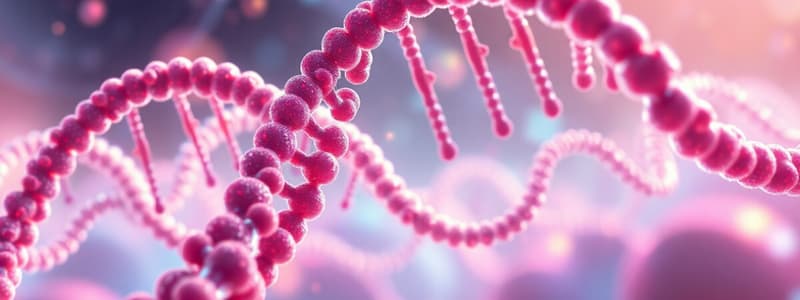Podcast
Questions and Answers
What primarily distinguishes RNA replication from DNA replication?
What primarily distinguishes RNA replication from DNA replication?
- RNA operates on a single-stranded RNA molecule. (correct)
- RNA uses double-stranded templates.
- RNA replication occurs only in viruses.
- RNA replication is less complex than DNA replication.
What is a crucial enzyme involved in synthesizing new RNA molecules during RNA replication?
What is a crucial enzyme involved in synthesizing new RNA molecules during RNA replication?
- Protease.
- Reverse transcriptase.
- DNA polymerase.
- RNA-dependent RNA polymerase (RdRP). (correct)
Why are mutations more common in RNA replication than in DNA replication?
Why are mutations more common in RNA replication than in DNA replication?
- RNA viruses replicate faster than DNA viruses.
- RNA replication errors are corrected by enzymes.
- RNA replication lacks any proofreading mechanisms. (correct)
- DNA is inherently more fragile than RNA.
What role do RNA viruses play in the study of RNA replication?
What role do RNA viruses play in the study of RNA replication?
Which statement regarding RNA replication mechanisms is accurate?
Which statement regarding RNA replication mechanisms is accurate?
What could be a potential application of studying RNA replication?
What could be a potential application of studying RNA replication?
How does the single-stranded nature of RNA impact its replication?
How does the single-stranded nature of RNA impact its replication?
Which of the following is NOT a characteristic of RNA replication?
Which of the following is NOT a characteristic of RNA replication?
Flashcards
RNA Replication
RNA Replication
The process of creating a new RNA molecule from a pre-existing RNA template.
RNA Replication vs DNA Replication
RNA Replication vs DNA Replication
RNA replication uses a single-stranded RNA template, unlike DNA replication, which uses a double-stranded DNA template. They use different enzymes and mechanisms
RNA Polymerases
RNA Polymerases
Enzymes that synthesize new RNA molecules during RNA Replication.
RNA-Dependent RNA Polymerases (RdRPs)
RNA-Dependent RNA Polymerases (RdRPs)
Signup and view all the flashcards
Viral RNA Replication
Viral RNA Replication
Signup and view all the flashcards
Replication Errors & Mutations
Replication Errors & Mutations
Signup and view all the flashcards
RNA Replication Mechanisms
RNA Replication Mechanisms
Signup and view all the flashcards
Mutations from RNA Replication
Mutations from RNA Replication
Signup and view all the flashcards
Study Notes
RNA Replication Overview
- RNA replication is the process of creating a new RNA molecule from a pre-existing RNA template.
- This process differs significantly from DNA replication, notably due to the single-stranded nature of RNA.
- RNA replication occurs in various biological systems, including some viruses, certain types of RNA-dependent RNA polymerases.
RNA Replication vs. DNA Replication
- Unlike DNA replication, which employs a double-stranded template, RNA replication operates on a single-stranded RNA molecule.
- The specific enzymes and mechanisms involved in RNA replication also differ significantly from those in DNA replication.
- The process of RNA replication can lead to mutations even without the help of mutating enzymes.
RNA Polymerases
- Specific RNA polymerases are crucial for synthesizing new RNA molecules.
- These enzymes are crucial for the replication process.
- The exact types and mechanisms vary depending on the specific biological system.
Viral RNA Replication
- RNA viruses, such as retroviruses and certain other viruses, use RNA replication to make copies of their genetic material.
- This process can be more complex compared to RNA replication in other contexts.
- Replication occurs inside the host cell.
RNA-Dependent RNA Polymerases (RdRPs)
- RNA replication often relies on RNA-dependent RNA polymerases (RdRPs).
- RdRPs are enzymes that synthesize RNA using an RNA template.
- RdRPs are crucial for RNA replication in many RNA viruses.
Differences in Replication Mechanisms
- RNA replication mechanisms exhibit significant differences compared to DNA replication.
- While DNA replication has a proofreading mechanism, some RNA replication mechanisms are less precise.
- RNA's single-stranded nature plays a major role in these differences.
RNA Replication Mechanisms
- There is not one standard RNA replication mechanism.
- The mechanism differs depending on the specifics of the RNA virus or the organism's biological system.
- Some types might involve more than one RNA polymerase, or enzyme.
Replication Errors and Mutations
- RNA replication can introduce errors that lead to mutations.
- Due to less precise replication, mutations in RNA are more common than in DNA.
- These mutations can affect the functionality or structure of the replicated RNA molecule.
Applications of Studying RNA Replication
- Understanding RNA replication is vital for developing treatments against RNA viruses.
- Studying RNA replication is crucial in comprehending fundamental biological processes.
- Knowledge of replication mechanisms contributes to understanding gene expression and evolution.
Studying That Suits You
Use AI to generate personalized quizzes and flashcards to suit your learning preferences.




